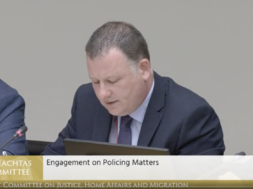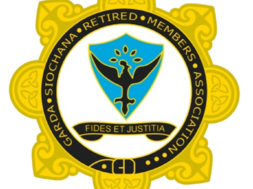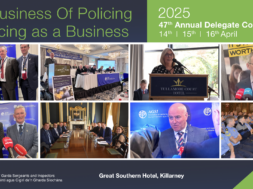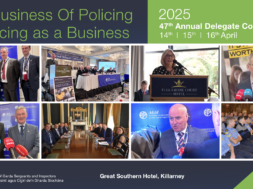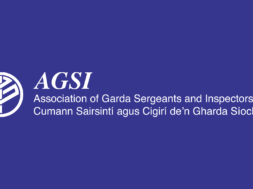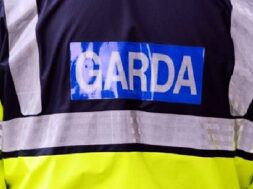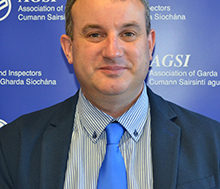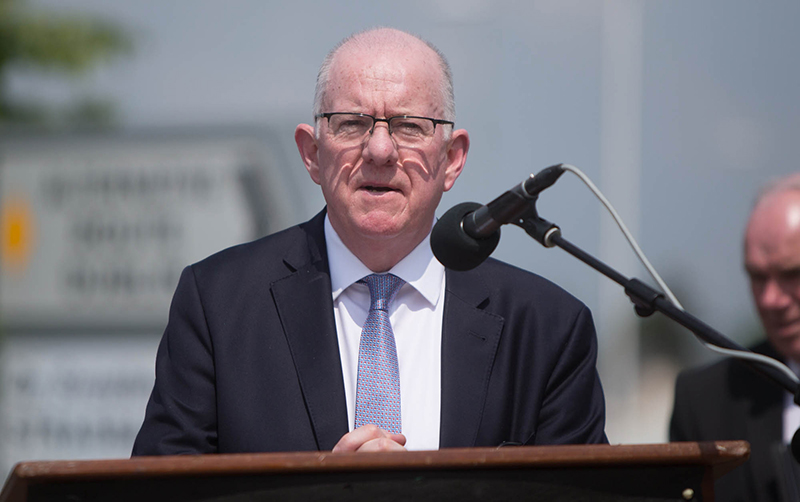
Speech by the Minister for Justice and Equality on the Third Interim Report of the Disclosures Tribunal
17 October 2018
A Cheann Comhairle, I am very pleased that the House has decided to set aside time to debate the Third Interim Report of the Disclosures Tribunal. There is no doubt that the report is comprehensive and detailed and merits careful reading.
It is, however, very clear what its main findings are and what Mr Justice Charleton considers should be foremost in our minds in responding to it.
The principle finding relates to the treatment of Sergeant Maurice McCabe. The Tribunal has set out in a clearly and stark way the ordeal which Sergeant McCabe endured. Many aspects of the report make for very disturbing reading. What shines through at all times in this report is the courage and incredible resilience of Maurice McCabe and his loving family.
As I told the House this morning, since the report was published I have spoken with Sergeant McCabe on the phone and on behalf of the State I apologised to him and his family for the manner in which he was treated over a prolonged period. He was extremely gracious and accepted that apology in the spirit in which I offered it.
I intend to meet Sergeant McCabe in person in the coming weeks and I look forward to those discussions.. I know that the entire House joins with me in wishing him well. My sincere hope is that he, his wife Lorraine and their family, can now put this horrendous and prolonged ordeal behind them and get on with their lives.
There is no doubt in my mind that Maurice McCabe has done the state some service. And while this module of the Tribunal addressed Sergeant McCabe’s situation, the report shines a light on many issues and events – and contains many important lessons for all of us.
A Cheann Comhairle, I propose to look at the report’s main findings and then outline the way forward as I see it.
But first, I should, once again, express my thanks and appreciation to Mr Justice Charleton for the efficient and effective manner in which he conducted the Tribunal’s business and the clarity of his report and conclusions.
I also want to offer my thanks to Mr Justice Sean Ryan, the former President of the Court of Appeal, who will take over the Tribunal’s work in relation to the matters covered by the remaining paragraph [p] of its terms of reference.
That paragraph covers any Gardaí who made protected disclosures and who allege that they were subsequently targeted or discredited as a result.
Ceann Comhairle, I would like to briefly refer to the background to the matters before this Tribunal.
The Tribunal arose, essentially, out of two protected disclosures made by Superintendent David Taylor and Sergeant McCabe to my predecessor as Minister for Justice and Equality, Frances Fitzgerald, in the autumn of 2016.
Those protected disclosures alleged that a campaign was being run by senior Gardaí to discredit Sergeant McCabe. I think the members of the House are sufficiently aware of the details so let me just say in general terms what these were.
The primary allegations which gave rise to this Tribunal related to:
- the alleged use of an entirely false allegation of serious criminal misconduct by Sgt McCabe and the involvement of TUSLA in this regard;
- allegations that the then Garda Commissioner, Noirín O’Sullivan, sought to use these allegations to discredit Sgt McCabe at the O’Higgins Commission of Investigation; and
- that senior members of the service acted in a manner intended to discredit or traduce Sergeant McCabe.
I’ve already said that the report and its findings need to be read carefully but its primary conclusions are clear:
- The report is emphatic in its vindication of Sergeant Maurice McCabe.
- It states that he is a genuine person who was concerned to maintain standards and that he has done the State considerable service by bringing failures within An Garda Síochána to the attention of the wider public. Sergeant McCabe deserves the gratitude of all of us for bringing serious shortcomings to public attention.
As I said at the outset, I have spoken with Sergeant McCabe and will meet with him shortly.
- The report finds that an error made in preparing a report on allegations against Sergeant McCabe was allowed to remain uncorrected. This was a TUSLA issue and will be addressed later by my colleague Minister Zappone.
- No one before the O’Higgins Commission of Investigation ever accused Sgt McCabe of any crime, hinted at it, or engaged in any innuendo about it.
- The Tribunal found that both former Commissioner Martin Callinan and Supt. David Taylor had not been truthful in their evidence.
- The Tribunal accepts the evidence of my predecessor Frances Fitzgerald that she decided not to interfere following the email of 15 May 2015 informing her that an issue had arisen at the Commission of Investigation. The report emphasises that her response was a considered one. .
On a personal basis, I would like to say that Frances Fitzgerald is a loss to the Cabinet and I do not believe that her resignation served any public interest – though it may have served the political interests of some parties. I hope to see Frances returned to high office in the near future.
Returning to the Tribunal’s central findings:
- It is also accepted that the Minister did not speak with Commissioner O’Sullivan and the Tribunal finds that in fact no situation requiring intervention by the Minister occurred before the O’Higgins Commission.
- A particular allegation was made about my Department’s involvement with those transcripts but the report states clearly that the transcripts provided to the Tribunal from the O’Higgins Commission of Investigation are and always were complete despite unfounded media speculation to the contrary.
I would like to mention former Commissioner Noirín O’Sullivan. Commissioner O’Sullivan was the subject of a concerted campaign to undermine her position over a period of time – from the leaking of partial and misleading transcripts from the O’Higgins Commission right up to the making of the two Protected Disclosures and even following the establishment of the Tribunal itself.
While I accept that the Oireachtas has a vital role in ensuring accountability, it is incumbent on all of us as elected representatives not to abuse the responsible positions we hold. What we expect of others, we should also expect of ourselves. During her tenure as Commissioner, Nóirín O’Sullivan was frequently before Oireachtas Committees and subjected to questions that sometimes crossed the line that divides robust inquiry from personalised attack. I would ask Members who were party to that process to reflect carefully on their behaviour at that time.
In the end, these allegations, which have been found by the Tribunal to be unsupported by evidence, became more than anyone could reasonably bear, particularly in an extremely pressurized, responsible and visible job such as that of Garda Commissioner.
The Tribunal did not find any evidence that the former Commissioner was party to the calumny visited upon Sergeant McCabe or indeed any wrongdoing on her part in relation to Superintendent Taylor. I think it is important, in all the circumstances, that these findings are recorded in the House. As I did on the occasion of her retirement, I want to thank Commissioner O’Sullivan for her service and wish her well.
Moreover, while some members of An Garda Síochána are revealed by the Tribunal to have behaved reprehensively, Mr. Justice Charleton also highlights the diligent and professional approach taken by many members of the organisation and, as Minister for Justice and Equality, this gives me grounds for optimism for the future.
Mr Justice Charleton raises the fact that this House did not debate his Second Interim Report dealing with terms of reference [n] and [o] regarding complaints made by Garda Keith Harrison. Deputies will acknowledge that there can be a level of furore in this House in relation to a matter giving rise to a Tribunal that is seldom matched by in-depth analysis on publication of the report, particularly if it makes for uncomfortable reading for members of the Houses. I do not think we should shy away from self-reflection as a parliament if we are to maintain a healthy democracy.
Garda Harrison and his partner Marisa Simms, alleged that the Garda Síochána at the highest level had prevailed on the HSE to intervene in their family affairs as a consequence of the making of protected disclosures by Garda Harrison. Members will recall the media coverage of these allegations which put together with Sergeant McCabe’s experiences with TUSLA opened the appalling vista of the Garda Síochána colluding with the social services to target members who raised issues.
Mr Justice Charleton fully investigated Garda Harrison’s allegations. He finds: ‘All of the allegations of Garda Keith Harrison and Marisa Simms examined by the tribunal are entirely without validity.’ Mr Justice Charleton goes on to say that ‘It is appropriate here to exonerate everyone in social services and in policing accused by them of discreditable conduct.’ His words require no further elucidation on my part.
Let me turn to the future. I very much welcome the Garda Commissioner’s initial response to the report last week.
I will be discussing matters raised in detail with Commissioner Harris and assuring him of my support as he addresses the findings in this Report. It is clear that there are consequences to be dealt with for individuals and much of that will fall to the Garda Commissioner. It would not be helpful for me to comment directly on these matters in this debate. This House must leave any due process that arises to take its course in respect of serving employees. I can assure Deputies that any action required of myself or my Department will be followed up speedily and thoroughly. I will be engaging directly with the Commissioner in the coming days.
Mr Justice Charleton also refers to protected disclosures and how they were used in the lead-up to the establishment of the Tribunal. I note that he questions in particular if there is a lacuna in the system whereby protected disclosures, properly made in accordance with the 2014 Protected Disclosures Act, are then made available to members of the Oireachtas and to the media where those the subject of the allegations have little or no opportunity to respond. This has created a situation where those accused are practically considered guilty until proven innocent; it is an abuse of an Act introduced to protect genuine whistleblowers from reporting what they reasonably believed to be genuine wrongs.
I believe that the issue raised by the Tribunal merits consideration and I will raise this with my colleague the Minister for Public Expenditure and Reform whose Department has carriage of this legislation.
Mr Justice Charleton is right when he says that new structures will not of themselves create the culture that would avoid the repetition of bad practice that has been highlighted now in a number of reports on the Garda Síochána – it requires significant cultural change, embedding consistent good practices and conscientious supervision by those in management ranks.
An Garda Síochána commissioned an independent organisation culture audit earlier this year which spoke to many rank and file Gardaí and the report also highlights many of the issues addressed by the Tribunal’s report. It is imperative that measures are taken by the Garda Commissioner to address the findings of the audit.
Furthermore, as Deputies will be aware, the Commission on the Future of Policing in Ireland reported on 18 September. The Commission has produced a comprehensive road map for the transformation of An Garda Síochána.
No more than the Disclosures Tribunal Report, I would strongly recommend that anyone with an interest in policing read the Commission’s Report, cover to cover.
I am currently engaged in a consultation process with the Departments and agencies impacted by the Report and I will be returning to Government with a High Level Implementation Plan in December.
The Report specifically recommends a new oversight architecture for policing that defines and separates responsibility for governance, oversight and accountability. It also addresses the critical issue of discipline in An Garda Síochána and, similar to Mr Justice Charleton, recommends a new disciplinary regime.
GSOC would be replaced by a new complaints body that would handle all complaints against An Garda Síochána that raise serious issues about standards of policing or police integrity itself, such as potential breaches of the law, violation of human rights or corruption, or issues that might indicate a widespread or systemic problem within the police. These measures and others in the Report have the potential to break the cycle of controversy that has beset An Garda Síochána for too long.
The implementation plan for the Commission’s report will take full account of the issues and recommendations raised in the Tribunal report.
To return to where I began. Sergeant Maurice McCabe has done the State a huge service. Judge Charleton has done likewise.
But their service will be for nothing if we do respond appropriately. I was greatly taken with the set of obligations of Gardaí set out towards the end of the report:
- To take pride in their work and their uniform
- To always be honest
- To be visible
- To be polite
- To serve the people of Ireland
- To treat the obligation to the public as superior to any false sense that Gardaí should stick up for each other
- And finally the obligation of self-analysis.
These are simple values – doing the right thing, being honest and decent – but they are fundamental. These are the standards that we should all observe, as public servants, as members of this House, indeed as human beings, and they are certainly what the public has a right to expect of An Garda Síochána at all levels.
My own Department is engaged in a reflective process in undertaking the fundamental transformation of its structures and processes arising from first report of the Effectiveness and Renewal Group. The second interim report was published yesterday and comments favourably on good progress having been made. That self reflection will continue, and deepen, to take on board the Tribunal report.
Clearly, there are lessons for An Garda Síochána, for my Department and indeed all public bodies, for the Government, for the Oireachtas and, not least, for the media. A central tenet for all of us is that we must learn how to deal more effectively in facing up to and determining the truth of allegations while not making the mistake of treating these as given facts in all circumstances. And above all, we must as a society respond appropriately to those who speak up to highlight a wrong. For my part, I am determined that these lessons must be, and will be, learned and applied.
Thank you, a Cheann Comhairle.
ENDS

